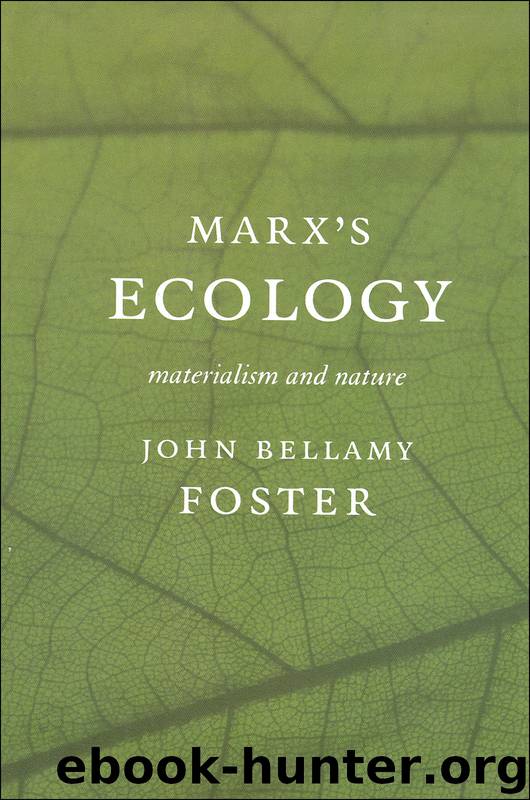Marx's Ecology by John Bellamy Foster

Author:John Bellamy Foster
Language: eng
Format: epub
Publisher: Monthly Review Press
Published: 2000-03-19T16:00:00+00:00
Marx’s analysis of sustainability
An essential component of the concept of metabolism has always been the notion that it constitutes the basis on which the complex web of interactions necessary to life is sustained, and growth becomes possible. Marx employed the concept of a “rift” in the metabolic relation between human beings and the earth to capture the material estrangement of human beings within capitalist society from the natural conditions which formed the basis for their existence—what he called “the everlasting nature-imposed condition[s] of human existence.”
To insist that large-scale capitalist society created such a metabolic rift between human beings and the soil was to argue that the nature-imposed conditions of sustainability had been violated. “Capitalist production,” Marx observed, “turns towards the land only after its influence has exhausted it and after it has devastated its natural qualities.” Further, this could be viewed in relation not only to the soil but also to the antagonistic relation between town and country. For Marx, like Liebig, the failure to return to the soil the nutrients that had been removed in the form of food and fiber had its counterpart in the pollution of the cities and the irrationality of modern sewerage systems. In the third volume of Capital he noted that “In London … they can do nothing better with the excrement produced by 4 1/2 million people than pollute the Thames with it, at monstrous expense.” Engels was no less explicit on this point. In addressing the need to transcend the antagonistic division of labor between town and country in The Housing Question, he referred, following Liebig, to the fact that “in London alone a greater quantity of manure than is produced by the whole kingdom of Saxony is poured away every day into the sea with an expenditure of enormous sums.” It was therefore necessary, he argued, to reestablish an “intimate connection between industrial and agricultural production” together with “as uniform a distribution as possible of the population over the whole country” (an argument that Marx and Engels had made in The Communist Manifesto). Writing in volume 3 of Capital, Marx was adamant in insisting that the “excrement produced by man’s natural metabolism,” along with the waste of industrial production and consumption, needed to be returned to the soil, as part of a complete metabolic cycle.62
For Marx, the metabolic rift associated at the social level with the antagonistic division between town and country was also evident on a more global level: whole colonies saw their land, resources, and soil robbed to support the industrialization of the colonizing countries. Following Liebig, who had contended that “Great Britain robs all countries of the conditions of their fertility” and had pointed to Ireland as an extreme example, Marx wrote, “England has indirectly exported the soil of Ireland, without even allowing its cultivators the means for replacing the constituents of the exhausted soil.”63
Hence, it is impossible to avoid the conclusion that Marx’s view of capitalist agriculture and of the metabolic rift in the nature-imposed relations between
Download
This site does not store any files on its server. We only index and link to content provided by other sites. Please contact the content providers to delete copyright contents if any and email us, we'll remove relevant links or contents immediately.
| Anarchism | Communism & Socialism |
| Conservatism & Liberalism | Democracy |
| Fascism | Libertarianism |
| Nationalism | Radicalism |
| Utopian |
The Secret History by Donna Tartt(19053)
The Social Justice Warrior Handbook by Lisa De Pasquale(12187)
Thirteen Reasons Why by Jay Asher(8893)
This Is How You Lose Her by Junot Diaz(6877)
Weapons of Math Destruction by Cathy O'Neil(6265)
Zero to One by Peter Thiel(5786)
Beartown by Fredrik Backman(5737)
The Myth of the Strong Leader by Archie Brown(5500)
The Fire Next Time by James Baldwin(5431)
How Democracies Die by Steven Levitsky & Daniel Ziblatt(5215)
Promise Me, Dad by Joe Biden(5141)
Stone's Rules by Roger Stone(5081)
A Higher Loyalty: Truth, Lies, and Leadership by James Comey(4954)
100 Deadly Skills by Clint Emerson(4921)
Rise and Kill First by Ronen Bergman(4779)
Secrecy World by Jake Bernstein(4741)
The David Icke Guide to the Global Conspiracy (and how to end it) by David Icke(4709)
The Farm by Tom Rob Smith(4502)
The Doomsday Machine by Daniel Ellsberg(4484)
